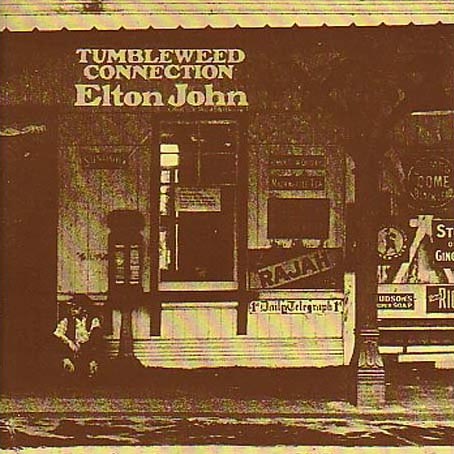- In a rare alignment of planets the Country Music Awards are actually in agreement. the pride of Texas, Miranda Lambert has been nominated for a record-breaking nine Country Music Association Awards, the most for any female country music artist in the history of the awards program. This almost makes up for the years that the CMA has been celebrating glitter and hairspray bull dung. I predict that Miranda will no longer be known as the blond country music singer that’s not Taylor or Carrie. Let’s hope the CMA carries through with this stumble into excellence and give her 9 wins.
- In case you missed it, all last week NPR’s Fresh Air dug through their extensive interview archives for their excellent Country Music Week special. Terri Gross’ interviews and spotlights legends like Waylon Jennings, George Jones, Merle Haggard, Willie Nelson, Charlie Louvin, John Doe and more. Check it out.
- On of my most anticipated releases next month is The Union, the T-Bone Burnett produced collaboration between Elton John and Leon Russell. The album also features Hohn’s long-time lyricist Bernie Taupin who had a hand in writing songs and Elton and Russell playing piano simultaneously. You can listen to two of the 14 songs from the album, If It Wasn’t for the Bad (the disc’s first single which is on sale digitally now) and I Should Have Sent Roses (don’t let the cheesy opening music in the videos for the logo fool you.) Russell and John are scheduled to perform together on November 3, at the Hollywood Palladium. The Union will be released on October 19.
- It has been a been a long time coming but it looks like The Last Rights of Ransom Pride, the Ray Wylie Hubbard co-written dark Western, starring Kris Kristofferson, Dwight Yoakam, is finally having some premier showings. The Los Angeles Premiere will be at 12am on Friday, September 10 and Saturday, September 11 with upcoming releases in Dallas, TX, Ft. Worth, TX, Denton, TX and Phoenix, AZ. Check the film’s web site to leearn more, buy tickets and bring the film to your town.
[youtube]http://www.youtube.com/watch?v=6j-kXAz5DQ0[/youtube]
From: the dwarf <whokilledthedwarf@gmail.com>
Subject: LAST RITES OF RANSOM PRIDE IN THEATRES
To: “scotty wilson” <scotty2fly@gmail.com>
Received: Thursday, September 2, 2010, 7:02 PM
The wait is over… The Dwarf is here…
The Last Rites of Ransom Pride is coming to theaters. Thanks to you.
Come to The Los Angeles Premiere
12:00 AM Friday, September 10
12:00 AM Saturday, September 11
Laemmle Sunset 5
8000 Sunset Blvd.
West Hollywood, 90046
Get tickets now… http://www.laemmle.com/viewmovie.php?mid=6595
Upcoming Theatrical Screenings
Dallas, TX – September 16
Studio Movie Grill Royal Lane
11170 N. Central Expressway
Dallas, TX 75243
Ft. Worth, TX – September 17
Fort Worth, TX
7th Street Movie Tavern
2872 Crockett Street
Fort Worth, TX 76107
(682) 503-8100
Denton, TX – September 18
Denton Movie Tavern
916 West University Dr
Denton, TX 76201
(940) 566-FILM(3456)
Phoenix – Thursday, September 24
Fox Theater
Arizona Underground Film Festival
http://www.azundergroundfilmfest.com/home/
Tucson – Friday, September 25
Arizona Underground Film Festival
http://www.azundergroundfilmfest.com/home/
Calgary – Landmark Theater Dates and Times TBD
Raleigh — Dates and Times TBD
Asheville – Dates and Times TBD
Seeking Street Team to put up flyers and stickers in the cities listed above. Join the street team, get three free tickets to a city premiere and a signed movie poster.
If these cities are not in your area please visit LastRitesFilm.com and request the movie in your area. Click on Hold Your City for Ransom.


 Before he became the modern equivalent of Liberace and creator of Disney Soundtracks (1994’s The Lion King with Tim Rice) Sir Elton John (Reginald Dwight to his mum) was the reigning king of 70’s adult pop. Odds were if you tuned into an FM rock or pop station (often they were the same station as genre segmentation was less rigid back then) within 5 minutes you’d hear one of his omnipresent truckload of singles.
Before he became the modern equivalent of Liberace and creator of Disney Soundtracks (1994’s The Lion King with Tim Rice) Sir Elton John (Reginald Dwight to his mum) was the reigning king of 70’s adult pop. Odds were if you tuned into an FM rock or pop station (often they were the same station as genre segmentation was less rigid back then) within 5 minutes you’d hear one of his omnipresent truckload of singles. Tumbleweed Connection was the first time a road band had been used in the studio, making it more the Elton John band rather than just Elton on his own, and the bigger sound comes to life immediately on the blues-rock opener Ballad of a well-known Gun, the story of a gunslinger reaching the end of the road (though I prefer the more country-rock version found on disc 2 of the Legacy edition of TC) and My Father’s Gun a moody study on a Southern son’s legacy of avenging his father’s Civil War death that builds to a dramatic finale’. Both songs feature the soaring backing vocals of Madeline Bell, Tony Burrows and blue-eyed soul diva Dusty Springfield.
Tumbleweed Connection was the first time a road band had been used in the studio, making it more the Elton John band rather than just Elton on his own, and the bigger sound comes to life immediately on the blues-rock opener Ballad of a well-known Gun, the story of a gunslinger reaching the end of the road (though I prefer the more country-rock version found on disc 2 of the Legacy edition of TC) and My Father’s Gun a moody study on a Southern son’s legacy of avenging his father’s Civil War death that builds to a dramatic finale’. Both songs feature the soaring backing vocals of Madeline Bell, Tony Burrows and blue-eyed soul diva Dusty Springfield.